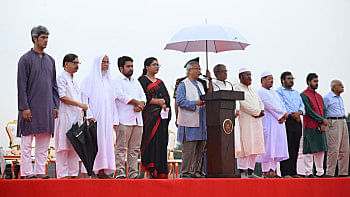The brunt of air pollution in Bangladesh

Air pollution is an atmospheric condition in which certain substances are present in abnormal concentrations. This kind of pollution severely interferes with normal enjoyment of life. However, the biggest impact of polluted air lies in how it endangers the health and safety of people. Generally, air pollution is classified in two types depending on its sources; outdoor/ambient and indoor/household. The two categories within which pollutants of the air can be classified are: gaseous and particulate. The most common air pollutants in Bangladesh are CO, CO2, NOx, and Pb. In addition, particulate matters, which are of 10 μm diameter or smaller in size, can penetrate and lodge deep inside the lungs and therefore are more detrimental than gaseous pollutants. As Bangladesh has ranked 179th out of 180 countries in the world for air quality in 2020 Environmental Performance Index, surely presence of these pollutants is around the extreme levels here. The major sources of these pollutants in Bangladesh have been identified to be industries, vehicles and biomass fuel emissions along with urban road dust. Researchers have recently claimed that toxic radon gas generating from urban homes is also polluting the air of Bangladesh.
With the rise in the number of concentrated industrial areas within metropolitan cities, our reliance on mechanical transportation system is greater than ever. By burning petrol, diesel, and octane to run automotive vehicles, we are releasing greenhouse gases which not only warm up the atmosphere but also makes the air impure. Meanwhile, poor air movement, heavy traffic, and congestion, uncontrolled emissions from over-loaded and faulty motor vehicle engines, dust particles, and other activities related to the extremely high population density have added to severe outdoor air pollution in Bangladeshi urban areas. Moreover, the brick kiln factories, which have been essential towards achieving urban advancements, contribute a lot to the rise of harmful emissions into the lower atmosphere.
In dealing with this outdoor air pollution, legal measures are in place. Section 6 of the Bangladesh Environment Conservation Act, 1995 makes the use of smoke controlling apparatus mandatory for all vehicles before plying on the roads of Bangladesh. A pollution under control certificate has to be obtained along with this. The Motor Vehicles Act, 2018 has imposed stricter penalties for violation of these provisions. Our industries have to obtain Environment Clearance Certificates from the Department of Environment to prove their efficacy in controlling pollution under this legislation.
From our legal perspective, the entire scenario of indoor air pollution is missing. It has been pointed out repeatedly by scientists that domestic energy consumption for the populations living in Bangladeshi rural areas depends on biofuels which emit harmful smoke. These emissions from common fuels like wood and cow dung are mostly composed of fine particles which cause life threatening diseases. What is worse, it is the vulnerable and poorer section of our society who are being exposed to this risk the most. Women who largely spend time indoors in close proximity to the stove are the most susceptible ones to this hazard. For children, heightened risk of asthma, respiratory infections, congenital abnormalities, and adverse neonatal conditions, and negatively effects on cognitive development are common impacts of indoor air pollution.
Through a system analysis, researchers have identified distinct steps to be taken in case of outdoor and indoor air pollution. In regard to solving the hazard of biomass fuels they suggested for improvement of cook stoves and called for better household ventilation. Promotion of alternative energy sources and better community education are essential in this regard. On the other hand, dealing with vehicle exhausts, they have suggested improved public transport, better urban planning, proper air quality monitoring and implementation of policy standards as necessary solutions. As it is our constitutional duty to protect and improve the environment, we need to prioritise the worst affected in doing so. Concentrated efforts of the government and citizens are now required to treat the damage that air pollution is causing to our health in whole.
The writer is an Assistant Professor at the Department of Law and Justice, Jahangirnagar University.

 For all latest news, follow The Daily Star's Google News channel.
For all latest news, follow The Daily Star's Google News channel. 



Comments